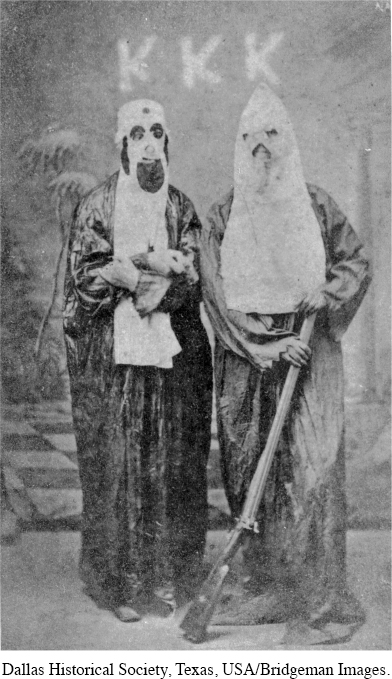The American Promise: Printed Page 454
MAKING HISTORICAL ARGUMENTS
The American Promise: Printed Page 454
Page 454What Did the Ku Klux Klan Really Want?
In 1866, six Confederate veterans in Pulaski, Tennessee, founded the Ku Klux Klan for fun and fellowship. By 1868, when congressional reconstruction went into effect, the Klan had spread across the South, and members had turned to more serious matters.
According to former Confederate general and Georgia Democratic politician John B. Gordon, the Klan owed its popularity to the “instinct of self-
Behind the Klan’s high-
The Klan punished blacks and whites who broke the Old South’s racial code. The Klan considered “impudence” a punishable offense. Asked to define “impudence” before a congressional investigating committee, one white man responded: “Well, it is considered impudence for a negro not to be polite to a white man—
Klansmen also took aim at black education. White men found the sight of blacks in classrooms hard to stomach. Schools were easy targets, and scores of them went up in flames. Teachers, male and female, were flogged, or worse. Klansmen drove northern-

Planters also turned to the Klan as part of their effort to preserve plantation agriculture. An Alabama white admitted that in his area the Klan was “intended principally for the negroes who failed to work.” Hooded bands “punished Negroes whose landlords had complained of them.” Sharecroppers who disputed their share at “settling up time” risked a visit from the night riders. It was dangerous for freedmen to consider changing employers. “If we got out looking for some other place to go,” an ex-
Above all, the Klan terrorized Republicans. Klansmen became the military arm of the Democratic Party. They drove blacks from the polls on election day and assaulted Republican officeholders. Klansmen gave Andrew Flowers, a black politician in Chattanooga, a brutal beating and told him that they “did not intend any nigger to hold office in the United States.” Jack Dupree, president of the Republican Club in Monroe County, Mississippi, a man known to “speak his mind,” had his throat cut and was disemboweled while his wife was forced to watch.
Political violence reached astounding levels. Arkansas experienced nearly three hundred political killings in the three months before the fall elections in 1868. Louisiana was even bloodier, suffering more than one thousand killings in the same year. In Georgia, the Klan murdered three scalawag members of the legislature and drove ten others from their homes. As one Georgia Republican commented after a Klan attack: “We don’t call them [D]emocrats, we call them southern murderers.”
It proved hard to arrest Klansmen and harder still to convict them. “If a white man kills a colored man in any of the counties of this State,” observed a Florida sheriff, “you cannot convict him.” Federal intervention—
Questions for Analysis
Summarize the Argument: According to the author, what were the primary goals of the Ku Klux Klan?
Analyze the Evidence: Why did Klansmen believe that their actions were justified? What specific “crimes” did they aim to address? Why do you think they hid their identities?
Consider the Context: How did the Ku Klux Klan serve the counterrevolutionary goals of the South’s Democratic Party?